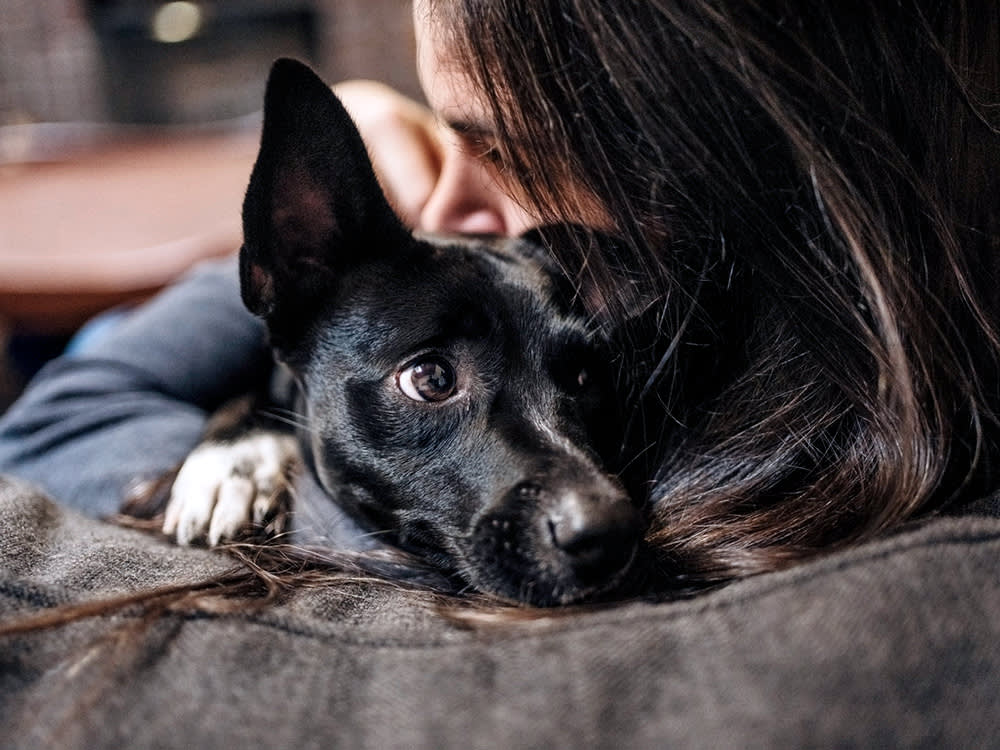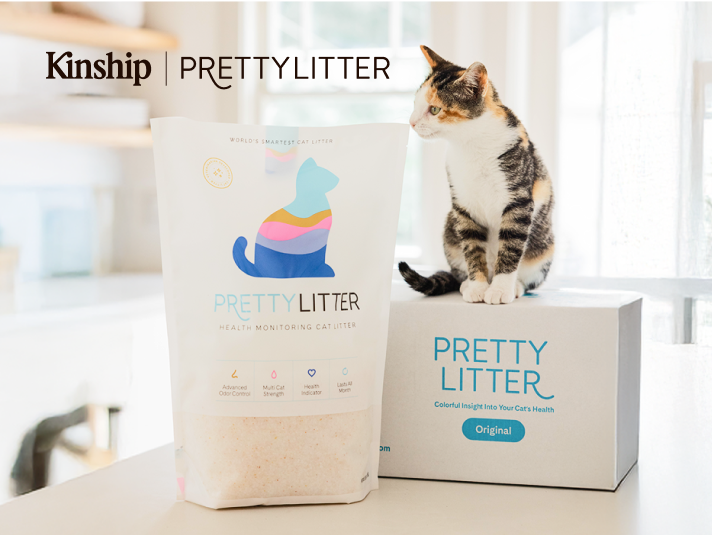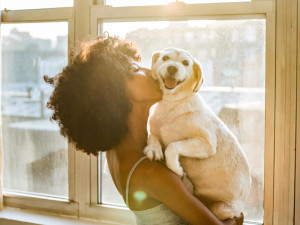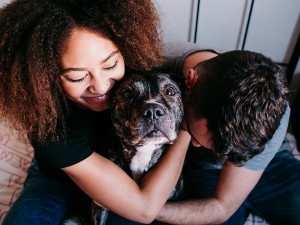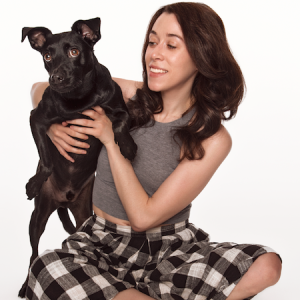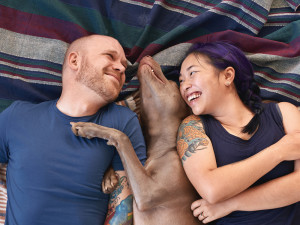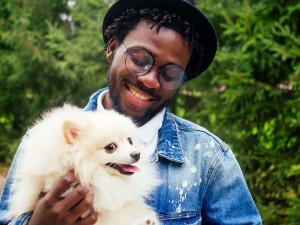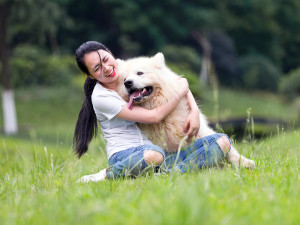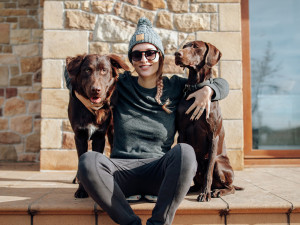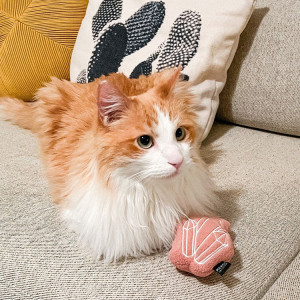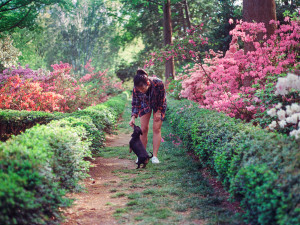Pet Parent Guilt Is Very Real—Here’s How to Stop Feeling So Bad About It
It’s a super common feeling, but it isn’t always healthy.
A few years ago, my dog broke his elbow while playing in the park. After examining his x-ray, the vet told me it seemed like the bone had sustained a stress fracture in the past and healed incorrectly; the new break was a re-break of that old wound, and he would need surgery to repair it.
The news added an additional layer of guilt onto what was already one of the scariest and most guilt-ridden days of my life. I had adopted him about two years earlier. There were no incidents in those years that would have caused a break, as far as I could remember. Had he been walking around in pain the whole time we’d known each other? For months after, I examined old photos of him, looking for signs I missed the first time around. In some, he favored one arm while sitting; he pressed his paw upwards slightly, and it was clear that he wasn’t putting his whole weight on it. How could I not have noticed?
Save on the litter with color-changing tech that helps you better care for your cat.
He’s heathy now, and loves running and playing, but I don’t think I’ll ever shake the guilt of not being observant enough in those first few years. It’s still the leader in the parade of guilty thoughts I return to when I can’t sleep at 3 a.m. And that parade is extensive — I should give him more attention, I think. I don’t think his walks are long enough. I wish I could explain why I can’t bring him with me everywhere. I wish when he nudged my computer with his nose I could stop working. I wish I were better.
This obviously isn’t a healthy way of thinking. And research into the topic has found that pet parent guilt is not only real, but it’s pervasive among pet parents, and it can lead to anxiety and depression.
Guilt among pet parents is incredibly common.
Dr. Lori Koganopens in new tab, a professor of clinical sciences at Colorado State University, has examined guilt in pet parents across several studies. In 2022, Kogan led a study, published in the journal Animalsopens in new tab, into pet parent guilt during the period of time when COVID-19 restrictions were lifting and people were returning to offices. The study calls this guilt “unrecognized, acknowledged, or supported.”
Kogan and her colleagues theorized that pet parent guilt would present itself as frequently as guilt found in human-only family studies, particularly guilt associated with work. They surveyed 592 American pet parents with dogs, roughly half male and half female, with 27 percent reporting that they also had human children, asking them to complete questionnaires gauging how they view themselves as a pet parent, and their bond with their dog. They were also asked to rate themselves with regard to 21 statements about guilt in dog parenting, and a dog version of the scale used to measure work-associated guilt in parents of human children.
It’s important to note that recruiting for this study did not mention guilt specifically, so as not to attract unusually guilty-feeling participants. Still, every participant reported feeling guilt around the subject of their pet parenting, mirroring the results of human-only studies. “To me, this topic is so important because it's very unrecognized and unappreciated how common guilt is” for pet parents, Kogan says. “And we need to do more to legitimize it, and to give people permission to prioritize their pet.”
Sources of guilt are similar among pet parents.
Common areas of guilt reported by participants were leaving their pet at home to go to workopens in new tab, not playing with or walking their dog enough, and travel. I was curious if people in my circle felt guilt as frequently, and in the same areas, so I set up a survey and published it on social media for people to take as they liked. Out of 66 responses, 100 percent said they experienced guilt about their pet parenting.
My responses were similar to Kogan’s — people feel guilt about their work schedules, going on vacation, feeling angry about their animal’s natural behaviors, living in a small apartment, not being able to give them as much attention after having a human baby, and struggling to help them with behavioral issues. “I have a dog with a zillion behavioral problems,” one responder said. “He’s super high anxiety, extremely protective of me and our house, aggressive towards men, and terrified of larger dogs. I feel a lot of guilt around being perceived as someone who hasn’t invested the time, energy, effort, and money into training my dog, even though I have!! … I also give him trazadone sometimes for his anxiety, and feel guilt around medicating my dog and being judged for medicating my dog instead of addressing the underlying causes of his anxiety.”
Many felt an ambient guilt, seemingly just for not feeling like they’re making their pet happy enough. “I have a lot of anxiety and guilt around my cat. I love her so much, and spend a lot of time with her since I work from home most days. When I do spend time away from her I worry about her,” another responder said. “I think a lot of this comes from the fact that I live alone, and she is only really bonded to me, so I am pretty much solely responsible for her happiness.”
Pet parent guilt can lead to anxiety and depression.
In 2023, Kogan and her team completed separate follow-up studies with cat pet parentsopens in new tab and dog pet parentsopens in new tab, aiming to determine the mental health effects of carrying this guilt. The results of reported guilt in both dog and cat guardians were consistent with their 2022 study, with cat guardians reporting guilt in a lot of the same areas as dog guardians. “There are some things that are very specific to dogs, as far as things related to walking dogs,” Kogan says. “That, of course, doesn't typically apply to cats. But as far as spending time with them, or being too tired to play with them, or things like that — those things look the same.”
In both the dog and cat pet parent studies, participants who reported higher levels of guilt reported higher levels of anxiety and depression. “Our results suggest that cat-related guilt, analogous to parental guilt, is a significant predictor of anxiety and depression,” researchers in the cat study writeopens in new tab. “The results of our study suggest that dog owners’ guilt and dog-related work–family conflict are at comparable levels to those reported in human family studies,” say researches in the dog studyopens in new tab. “They are also both significant predictors of depression and anxiety.”
Pet parents’ coping mechanisms for guilt can sometimes be unhealthy.
As you likely know, dealing with this kind of guilt tends to mean turning away from human-focused activities to focus on your pet — declining dinners out, RSVPing “no” to parties, not going on vacation.
“It’s concerning to me that one of the ways people alleviate their guilt is by limiting their social activities,” Kogan says. “They feel guilty about going out in the evenings after they've been gone at work all day, or they feel guilty about going out on the weekends, or taking trips, or things like that.” She says she finds that concerning. “The ways people are trying to cope with their guilt could actually increase a sense of isolation or increased depression.”
Here's what you can do to help ease pet parent guilt.
Reading the responses to my own survey, I felt heartbroken for all of these people who are trying desperately to do their best to give their pets the loveliest life they possibly can, and still feeling like they aren’t doing enough. What I saw was an amazing group of pet parents carrying an intense, unnecessary weight. I realized I’m in that group, too.
Kogan says the best way to cope with this guilt is to reframe your thinking around your relationship with your pet. “Acknowledge to yourself that your pet really does have a good life,” she says. “I think that can be really healthy.” It’s easier said than done, of course, and may take the help of a therapist or supportive group of like-minded friends. But most of us are doing the very best we can. We love our pets, and we show them that every day. We just need to see it as well as they do.
